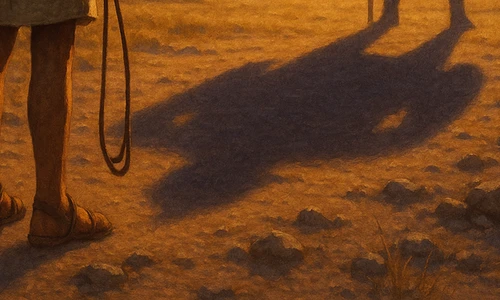This post is part of the series “King Jehoshaphat's Prayer”
-
King Jehoshaphat’s Prayer: 8 Bible-Backed Steps to Trade Panic for Peace 👈 you are here
-
Who Was Jehoshaphat Anyway?
-
Who Were the Moabites? Origins, Israel’s Enemies, and Ruth
-
Sitting In the Shadows of History: The Story of the Ammonites
-
Everywhere and Nowhere: The Story of the Amalekites
King Jehoshaphat’s prayer in 2 Chronicles 20 turns panic into peace: he pauses, gathers Judah, praises God’s past victories, petitions for help, and then acts—and God fights. This is Scripture’s clear 8-step model for crisis prayer.
📥 Download high-resolution image | 👇 Get the full devotional guide
Why this study? In Spring of 2020, while COVID-19 upended daily life, I turned to Jehoshaphat’s story for steadiness. The eight steps proved bigger than one crisis—so here they are for every season of overwhelm.
Like many of you, I felt blindsided when the world shut down in response to the coronavirus pandemic. And like many of you, I turned to Scripture, where we find dozens of verses crying into the darkness, “Do not be afraid!” But I craved a concrete roadmap of how not to be afraid. Enter Jahaziel, advisor to King Jehoshaphat…
“Do not be afraid, and do not be dismayed at this great horde, for the battle is not yours but God’s.”
If you’re not a current student of ancient Israelite history, you might be thinking: wait, what battle?
Back up a few verses, and you’ll find that King Jehoshaphat, one of the rare good kings after Solomon, was facing the Moabites and the Ammonites, ancient enemies of the Israelites… at the same time.
This is his story.
Pause: Look First to GodPermalink
Then Jehoshaphat was afraid and set his face to see the Lord, and proclaimed a fast throughout all Judah.
Immediately after Jehoshaphat heard of the approaching armies, he determined to seek the Lord. Not to find God for the first time in fear, but to look to God for wisdom, discernment, and to understand His will.
Then he proclaims a national fast, joining his people together with him. Fasting is deeply attached to prayer in Scripture. Esther, for example, also asked for a national day of fasting (Esther 4:16) before she went “into battle” to save the Jews from one of Emperor Xerxes’s advisors. Perhaps most famously, Jesus fasted for 40 days at the beginning of His ministry (Matthew 4:2), and He later taught His disciples about a type of demon that “can only come out through prayer and fasting” (Matthew 17:21).
Look first to God.
Gather: Gather Your People TogetherPermalink
And Judah assembled to seek help from the Lord; from all the cities of Judah they came to seek the Lord.
Not only did Judah fast, but the people came from all over to be with King Jehoshaphat during this crisis. During the 2020 coronavirus pandemic, gathering together physically is not a good idea—but that doesn’t mean you can’t go to your people and ask them to join you in fasting and prayer.
Jehoshaphat’s PrayerPermalink
And Jehoshaphat stood in the assembly of Judah and Jerusalem, in the house of the LORD, before the new court, and said, “O LORD, God of our fathers, are you not God in heaven? You rule over all the kingdoms of the nations. In your hand are power and might, so that none is able to withstand you. Did you not, our God, drive out the inhabitants of this land before your people Israel, and give it forever to the descendants of Abraham your friend? And they have lived in it and have built for you in it a sanctuary for your name, saying, ‘If disaster comes upon us, the sword, judgment, or pestilence, or famine, we will stand before this house and before you—for your name is in this house—and cry out to you in our affliction, and you will hear and save.’ And now behold, the men of Ammon and Moab and Mount Seir, whom you would not let Israel invade when they came from the land of Egypt, and whom they avoided and did not destroy—behold, they reward us by coming to drive us out of your possession, which you have given us to inherit. O our God, will you not execute judgment on them? For we are powerless against this great horde that is coming against us. We do not know what to do, but our eyes are on you.”
The prayers of the many are powerful! Don’t take my word for it; go to Scripture. Jesus said, “If two of you agree on earth about anything they ask, it will be done for them by my Father in heaven.” (Matthew 18:19) After Jesus died and rose and ascended to heaven, perhaps the greatest crisis in the history of the world, the terrified disciples gathered together in the upstairs of a house to pray until the Jesus’s promise of a helper was fulfilled (Acts 1:13–14).
Gather your people together.
Praise: Remember Who God Is and What He Has DonePermalink
“O Lord, God of our fathers, are you not God in heaven? You rule over all the kingdoms of the nations. In your hand are power and might, so that none is able to withstand you.”
King Jehoshaphat begins his prayer not with desperation but with faith: God is mighty, ruling over kings and nations. And God’s might is ancient. When Jehoshaphat says “God of our fathers”, he doesn’t just mean Dad and Grandpa, he means Abraham and Isaac and Jacob and Moses and David—the patriarchs, the prophets, and the kings.
There are many patterns of prayer. Two common mnemonics, JOY and ACTS, suggest beginning prayer with praise of God: “J” is for “Jesus”, and “A” is for “Adoration.” King Jehoshaphat didn’t have those helpers, partly because he lived 2,700 years ago, and partly because he spoke Hebrew, so they wouldn’t have made sense anyway. But he nonetheless starts out with a bold declaration of the character and power of God.
Remember who God is.
“Did you not, our God, drive out the inhabitants of this land before your people Israel, and give it forever to the descendants of Abraham your friend?”
I just told you King Jehoshaphat was thinking of thousands of years of God’s promise and presence with His people—I confess, I cheated by reading ahead a verse. Here he explicitly remembers what God said to Abraham (Genesis 15) and to Moses (Exodus 19). He knows God can defeat these armies because He’s done it before, when Israel first entered the Promised Land, and again later when King David secured its borders.
Remember what God has done.
Recall: Recall God’s PromisesPermalink
“If disaster comes upon us, the sword, judgment, or pestilence, or famine, we will stand before this house and before you—for your name is in this house—and cry out to you in our affliction, and you will hear and save.”
After Israel entered the Promised Land, God wasn’t done. And neither is Jehoshaphat. He remembers that God still loves His people, and claims for himself God’s promise to “hear and save” His people from affliction.
Throughout the Bible, God rains down promises for His people that carry through the centuries and are made just as much for you as they were for Jehoshaphat. One reason we can be sure God loves us is that He keeps fulfilling these promises, over and over—in the Bible, in the life of the church, and in the lives of Christians everywhere.
Recall God’s promises.
Confess: Tell God What’s Going OnPermalink
“And now behold, the men of Ammon and Moab and Mount Seir…behold, they reward us by coming to drive us out of your possession, which you have given us to inherit.”
Finally! Jehoshaphat gets to the point. Or, more accurately, he gets to the part most of us (including me, most days) would have started with: what’s going on. In case God hasn’t noticed.
Two armies are on their way toward him, and one would have been more than enough. But despite his panic, Jehoshaphat waits until step four to even bring it up!
I joked a minute ago that maybe God hasn’t noticed what’s going on with you. He has, I promise. But still, God likes to hear from you. You are His beloved child, and He enjoys your prayers—the Bible says your prayers are like sweet incense to God (Psalm 141:2). So go ahead and have a conversation with Him. “Here we are, God. Here’s what’s happening in my life.”
Tell God what’s going on.
Petition: Proclaim Your Fallenness and Your FaithPermalink
“O our God, will you not execute judgment on them? For we are powerless against this great horde that is coming against us. We do not know what to do, but our eyes are on you.”
Here we see King Jehoshaphat make his first request of God, six verses into his prayer. But I’m skipping right past that, because you know how to ask for things from God. We all do. I’m more interested in what else he says.
Why does he need God’s help? Because he is “powerless.” Because he, though a king, is nothing compared to the might of God Almighty. Because he and all his advisors and generals together “do not know what to do.” Have you ever felt this lost? This turned around? This confused? Tell God how you feel.
Proclaim your fallenness and your faith.
Listen: Listen For the Voice of GodPermalink
And Jahaziel said, “Listen, all Judah and inhabitants of Jerusalem and King Jehoshaphat: Thus says the Lord to you, ‘Do not be afraid and do not be dismayed at this great horde, for the battle is not yours but God’s.’”
This story is the basis for my book, King Jehoshaphat’s Prayer, but the centerpiece of this story is not Jehoshaphat’s prayer, but the word of God in response: “for the battle is not yours but God’s.”
Do not be afraid, King Jehoshaphat and people of Judah. Do not be dismayed, even though the army coming down on you will definitely destroy you. Because you don’t fight this battle. God fights it.
That doesn’t mean you won’t fight battles in your life! Be careful—this word is to Jehoshaphat and to Judah on one day, about one battle. But God is mighty. It may be that He will fight a battle for you, or maybe not—but it is always true that He will fight the battle with you. Don’t try to go alone. Hear Jahaziel from so many years ago. His first word is “Listen.”
Listen for the voice of God.
Act: Go Out and Meet the EnemyPermalink
“You will not need to fight in this battle. Stand firm, hold your position, and see the salvation of the Lord on your behalf…. Tomorrow go out against them, and the Lord will be with you.”
Here’s the hard part. Judah does not need to fight in this battle, but they do need to go out and meet the enemy (verse 17: “tomorrow go out against them”). They do need to stand firm. And the do need to watch God work.
There’s more to this story than the prayer. Read the rest of the chapter, and find out how Judah responds to God’s word with praise and singing. The next day, the singers go out before the army. First song, then swords. It turns out that instead of two armies, Judah actually faced three armies—but one of them turned on the other two and ambushed them. In the chaos, Judah was forgotten. God defeated three armies, and Judah stood firm and held its position and witnessed the salvation of the Lord on its behalf.
Go out and meet the enemy. And may God fight your battles for you.
Modern ApplicationsPermalink
My favorite part about this process is that we can apply it to all kinds of crises, not just coronavirus. Worried about finding a new job?
- Before you write one line of resume…
- Get your family and friends around you, and
- Remember God’s faithfulness in your past, or the past of people you know (hint: there’s a whole book of stories of God’s faithfulness).
- Remember that He has promised good to you (eventually).
- Tell Him you’re anxious about getting a job, about writing a good resume, about having enough experience, about finding opportunities, about rejection (that last one’s a big one for me).
- Confess your fears and failures, and proclaim your belief that He will indeed see you through this as He always has before.
- Sit and be still, and see what God has to say to your heart—or the hearts of those around you.
- Write the best resume you can, send it everywhere you know of, and rest assured that God’s perfect plan cannot be changed by a typo or an interview or anything else.
Maybe today it’s a job hunt; tomorrow it might be an illness. The pattern holds, because Scripture holds.
Reflection QuestionsPermalink
- Which of Jehoshaphat’s eight steps do you most often skip, and what would change if you slowed down to include it?
- “The battle is not yours but God’s” came after corporate fasting. How might shared spiritual practices prime you to hear God’s strategy in a crisis?
- Judah sang before the battle began. What song of faith could you sing now to pre-thank God for a victory you haven’t seen yet?
Jehoshaphat’s Prayer FAQPermalink
- Where is Jehoshaphat’s prayer in the Bible?
- 2 Chronicles 20:5-12 records the full prayer; God’s responsive promise is in verse 15.
- What enemies was Judah facing?
- A joint Moabite-Ammonite-Edomite army marching from the south.
- What does “the battle is not yours” mean?
- God sometimes claims ownership of a fight, asking His people only to obey and watch.
- Is fasting required with this prayer?
- Jehoshaphat proclaimed a fast (v 3); fasting aligns hearts, but isn’t a magic formula.
- How can I use this prayer today?
- Follow the 8 steps—pause, gather, praise, recall, confess, petition, listen, act.
This post is part of the series “King Jehoshaphat's Prayer”
-
King Jehoshaphat’s Prayer: 8 Bible-Backed Steps to Trade Panic for Peace 👈 you are here
-
Who Was Jehoshaphat Anyway?
-
Who Were the Moabites? Origins, Israel’s Enemies, and Ruth
-
Sitting In the Shadows of History: The Story of the Ammonites
-
Everywhere and Nowhere: The Story of the Amalekites



